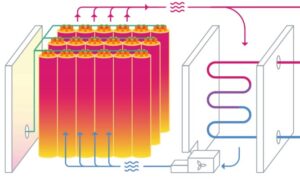As house prices soar and the rental living market gets crowded, newer living spaces are cropping up. Co-living is the latest buzzword among young people looking for cost-effective options that help them combat boredom and loneliness.
A co-living community is essentially a type of community that provides shared housing for people with similar values or intentions. But not all co-living spaces provide a safe and sanitary environment and memorable and meaningful experiences, beyond basic shelter. This is where Bengaluru-based Hyphen, started by Anirudh Rao, Rishi Sreedharan, and Samarth Gowda in 2021, hopes to make a difference with its range of bespoke communal housing options.
“We were sick and tired of the sub-standard, unsafe, unsanitary, and downright boring options out there masquerading as ‘co-living’, with little focus on community and products. Living products had to move up Maslow’s hierarchy and offer more than just shelter, food and basic facilities,” says Rishi Sreedharan, Co-founder and CEO, Hyphen.
A place to live, love and thrive
Hyphen positions itself as a provider of an experiential living community that redefines what it means “to live, love, work, and thrive under the same roof”.
Formerly called Dwellingo, Hyphen operates rental apartments, studios, and condos in standalone buildings. It provides residential and serviced housing options and services such as community events, meet-and-greet sessions, mixers, and coworking facilities, all for a single monthly rental.
In the beginning, the founders set out to build a high-quality living solution for tier-1, tier-2 and tier-3 cities. But soon they realised that there was so much more to offer and learn from communities and clubs. That’s how the idea of Hyphen transformed into more than just a place to stay or work in. “It’s a way of living,” says Rishi.
Hyphen’s spaces (which are called ‘clubs’) are geared towards young working professionals who seek “holistic lifestyle experiences”. Some of the recreational services on offer are inter-club football, cricket, and other sports tournaments (Hyphen Athletics). The startup is also looking to add services such as mixed martial arts and personalised calisthenics training under the guidance of renowned trainers. On the entertainment front, Hyphen has partnered with Sofar Sounds and SoMad, which curate invite-only events to give members “memorable night-outs”. These ‘Hyphen Select’ offerings include small living-room artist gigs and wine and Jäegermeister tasting to ‘paywhatyouwant’ gigs and sundowners.
The company does a consensual KYC and background check of each member to gauge their interests and inclinations and check if Hyphen is a good fit for them.
Hyphen Clubs have 1200 beds across all its spaces in Bengaluru, Delhi and Hyderabad. The spaces come equipped with services such as maintenance, community spaces, deep cleaning and sanitisation, WiFi, co-working spaces, on-site laundry, fully furnished rooms and kitchens, RFID access and security, resident-only app, and curated community events. The startup aims to have 6000 beds and expand into five markets by 2023.
“As a vessel that hopefully curates, sparks and fosters meaningful relationships within our communities through mixology sessions, open mic nights, free-flow yoga, or meet and greets, Hyphen has become a safe haven that our members can come home to and call their own,” says Rishi.
The team
Rishi had earlier worked as an investment banking associate at Merrill Lynch, Greater NYC and an investment associate at Charlotte-based VC firm Red Ventures. He oversees the day-to-day operations at Hyphen, as well as the strategy and technology initiatives of the company.
Samarth was previously a construction manager at CalAtlantic Homes in Palo Alto. He oversees property acquisition, business development, and day-to-day operations at Hyphen.
Anirudh had earlier headed campaign initiatives for past members of parliament. He was also a senior consultant for Andhra Pradesh Economic Development Board. At Hyphen, Anirudh’s role involves fundraising, high-growth initiatives, and cost optimisation.
Growth and funding
The startup does not work with house owners and operates like a community living hotel. It charges a membership fee for the extent of the members’ stay at a club.
The company has raised $1 million so far in a pre-seed round from notable angel investors, including Chirag Doshi (CIO of QIC, the largest insurance company in the MENA region) and Sriram Puthucode (former leader at Palo Alto Networks). It is also raising a “significantly larger round” over the next 90 days, says Rishi.
“We have been unit-level profitable from day one with a clear path to operating cash flow breakeven this quarter. Even though it’s only been a year of operations, we are growing at a compounded monthly growth rate of 255%,” he says.
The company says it has maintained 100% occupancy across its spaces. It is the living/real estate partner to edtech and fintech startups. Some of its enterprise partners include ‘soonicorns’ such as Scaler Academy.
Challenges in the journey
One of the biggest challenges the company is facing is hiring “a 10x standard leadership team”. Supply chain and rising commodity prices are other struggles, according to Rishi.
“Since we place huge emphasis on community, it has been a challenge to continue to find great members to add value to our existing community. When you are building a community-first product, it is important to ensure you build cohesiveness among members. This is a challenge we enjoy and it drives us to keep bettering our experience, messaging, and product to be specifically curated for each member but also be accessible to all.”
Building Hyphen Clubs using sustainable practices and materials, which are weatherproof and environment-friendly, is also challenging “but it is something we are committed to,” says Rishi.
“Whilst it wasn’t easy, we were fortunate enough to experience consumer love early on in our journey, with our focus on a premium differentiated communal living product. Our waitlists are testament to this.”
Market and competition
According to Rishi, the existing inventory of ready-to-lease, high-quality buildings in the market provides a nearly $50-million ARR (annual recurring revenue) opportunity, if a well-capitalised rental-living operator can capture even 10% of the market.
Overall, including built-to-suit properties on the demand side, the organised rental living market is a $6-billion market (as per 2011 Census of India). On the supply side, it’s a $645-million market annually, according to PropTiger’s ‘Real Insight Residential’ report.
“Hyphen operates a hybrid (living and working) model in India; so, we have no direct competition. Globally we would compete with Common living (USA) and Zoku Living (EU),” says Rishi.
The road ahead
The startup wants to take the Hyphen experience to all Indian cities soon. It expects to have 7000 beds by FY24. The company is in talks with Indian and global institutional partners to scale across India.
Hyphen also plans to expand into the student housing sector, which is a $10-12 billion market in India. Its student housing clubs will be operational in the heart of Delhi University’s North Campus.










